- Home
- Ian Wallace
A Voyage To Dari Page 5
A Voyage To Dari Read online
Page 5
“You comprehend me perfectly.”
“Our momentum then should carry us through the metagalactic skin back into the metagalaxy.”
“On the old relativity theories, our momentum would then be six or seven googolian times infinity. But that is absurd; and in fact, even with our momentum my weak lifeboat hull could not resist the toughness and turbulence. We would disintegrate.”
“Suppose they choose to brake us so that we will simply touch down?”
“That would slow us. Much more than one hour would be required.”
“Suppose they are capable of continuing to accelerate us until an instant before contact, then stopping us instantly while boosting your inertial shield to infinity?”
“Then we can expect contact within the hour.”
Croyd told Chloris, “Thank you. Please report again when ready.”
He turned soberly to me. “My friend, forgetting ourselves, things don’t look so good for the Djinn treaty.”
I quietly responded, “Until you are dead, I will have faith in the Lord and you; and then I will have faith in the Lord and myself. And when we are both dead, I will have faith in the Lord and humanity.”
Croyd considered me thoughtfully. “I think you have made your own decision between the worth of an individual and the worth of his society.”
“I would not call it a decision. It is more of an intuitive faith. But if I did not know you so well, my friend, I would be privately accusing you of disproportionate flippancy. I am thinking about at least one worthy individual whose probable death you appear to have brushed from your thought. And I do not mean either you or me . . . or Gorsky.”
There was a touch of poignancy in the smile that came onto Croyd’s mouth. “But you do know me well.” “Yes. And so I am not privately accusing.”
A frowning Croyd considered his own fingernails. He said presently, “Commandcom, are you capable of totally ignoring our conversation until I bring you in again?”
Crisp: “You need only command ‘Go out,’ and I will go out.”
Quizzical: “But if you are out, how will I bring you back?”
Pause. Then: “Bit of a problem here.” Further pause. “All right, I have programmed myself to come in when you say ‘Come in’; and if this raises in your mind a Chinese-box puzzle of questions, be easy: it will work.”
“Good, Chloris. Go out.”
“Acknowledged. Out.”
Long silence.
Croyd told his fingernails, “I prefer not to discuss my womanizations, but this one you have to know about. Djeel and Hanoku want marriage. Djeel must be deflowered by her chief. She thought I was her chief, and she came to me for this. I told her that in fact Tannen was ultimately her chief. This she accepted. There was nevertheless a passage of love between us. But she is sincere about Hanoku.” His hand dropped, his eyes came up. “And she is sincere about you, Mr. President.”
Much longer silence. Djeel was the Polynesian-type passenger in the lifeboat drill three days earlier.
I, then: “It becomes a delicate problem to talk about this without self-betrayal into bad taste, since they are dying.”
Croyd, firmly: “Somehow, Tannen, I am determined that they shall not die. Assume that they will not. And then you can forget the taste question.”
“That is what I was sure I was reading beneath the surface of your flippancy.”
“That is what you were reading.”
I tugged at an ear. “Then I will assume that they will live and be married. And instantly I see that the sort of officiation that she needs from me will be intricately difficult to avoid. And I will not deny pleasure in the notion. I am an old roué, Croyd . . . and mark well both words: a roué, and old.”
Croyd, without inflection: “So then there will be no difficulty.”
I was tugging now at my nose. “I would not go so far, Croyd. For her there will be difficulty. But on her Dari, there must frequently occur such a difficulty, since clan chiefs tend to be relatively old; and it is surmounted. But for me there will be at least three difficulties. One is the spectator aspect.”
“She assured me that this can be avoided. It can be accomplished discreetly beforehand. The only thing is, she must publicly announce it.”
“All right for that: I would take pride, hearing the announcement. But there is also this difficulty: would I afterward retain her friendship, and Hanoku’s, and yours, if I were to make an ass of myself?”
Unusually, tears came into his eyes. “My friend, nothing you might do, no matter how frustrating or grotesque, could make an ass of you in the purview of any woman or man of good will.”
Now I had out a handkerchief; I was sneezing loudly into it. Having recovered and wiped my eyes and nose and mouth and restored the fabric to my pocket, I placed hands on knees and told him directly, “The third difficulty is a culture hang-up. The ritual that is sacred in the lore of Djeel and Hanoku is anathema in mine. But I see no need for my antithesis to annihilate their thesis, in this or any other honest aspect of Dari culture. Here, as everywhere, we shall have to look about for a golden synthesis.”
Croyd watched me steadily.
I smiled, and I felt the smile deeply. “If, that is, we are given opportunity to look about for anything. I respect your determination that they shall live. Meanwhile, I am noticing that we may not.”
And in the ensuing silence, I found myself brooding over our second day out, when so many personal roads began to intersect intimately.
PRIOR ACTION : H-Hour minus 39 hours:
CROYD SLEPT LATE (until 0914—a scant thirty-nine hours ahead of unforeseeable ship disaster) into the morning after embarkation and the lifeboat drill. He awoke with a premonition of disaster—and he had learned to trust his premonitions: they did not come cheaply. Consequently, over breakfast and for an hour thereafter, systematically he scanned trouble possibilities. None that he could imagine seemed highly probable, and all of them were Gorsky’s business and not his. As a final measure, he spent half an hour fine-scanning his own brain: all seemed well in there. Shrugging, he back-burnered the premonition and turned his full attention to mission-planning.
Despite the mighty inertial shield of the Castel, her steadily mounting acceleration was starting to be faintly noticeable as a tiny fraction of one G. This thrust hint conveyed a background sense of motion, replacing the faint vibration of twentieth-century ocean liners.
He lunched alone in his cabin, and he pondered further until 1441, at which time a mental alarm clock reminded him that he was scheduled for a lecture to his staff at 1500 hours.
It was a good staff, a trained staff; he had met all of its members face-to-face, he knew their credentials, he had as much confidence as any leader can have in his own human brain extensions (each of whom has an ego of his own). Most of what he had been thinking, his staff knew. The staff training program had been developed under his guidance; his staff had undergone many preflight hours of this training. So what was there for Croyd to say to his staff at 1500 hours?
Well, he might perhaps communicate a bit of meaning.
In process of reconnoitering Croyd’s brain prior to initiating shut-off action, Childe Roland was distracted by his growing interest in the prelecture musings of the mind. Intricate, sensitive motivation—like nothing he had ever met! This had to be followed out. Relaxing, he prepared to listen.
He heard something entirely new for him: a deliberately unstructured lecture by a man supposed to be in high authority. Duke Dzendzel, now, would not have felt enough personal security to embark on an unstructured lecture.
Roland meditated. And quite a while passed before resolutely—just ahead of Admiral’s Mess—he returned to brain reconnaissance.
Most of the staff members left the lecture musing. I left musing. With me, most profounding musing, departed my special guest whose identity for special reasons I had been withholding from Croyd: a middle-dark young lady who had exchanged words with him aboard Commandcom Chloris. Croy
d had noticed her at the lecture and wondered again about her—she was not a staff member— but she had been with me, which made her all right; and nothing in his lecture had been restricted material.
H-Hour minus 29:
Dining at the admiral’s table, I was paired with Admiral Gorsky (another old friend), while Croyd found himself paired with the Polynesian-type stranger woman, whom I now introduced as Miss Gilligan Flynn, a supercargo on Interplanesco cultural studies. She and Croyd exchanged a little nonsense while Croyd scanned curiously unresponsive memory banks trying to recall when and where he had met her; but then gradually he became preoccupied with the sober conversation between the admiral and me in her native Moskovian.
All of this was deliciously irrelevant; and Croyd now threw himself all the more eagerly into voyage irrelevancy because his trouble premonition was growing, and there was absolutely no rational accounting for it. Look: Gorsky was wholly reliable, the perfect admiral; so this was a trouble-free voyage, wasn’t it? His difficulties would multiply swiftly enough on Dari at the far end. On a voyage, one forgets (except in thought and training sessions) all other considerations, full-tasting such inconsequential delights as Miss Gilligan Flynn, and projected metascience with Tannen, and now this pleasant exercise in this brand-new Moskovian . . .
For Croyd had never found time to learn this old language; and since we talkers did not seem disturbed at his eavesdropping, while Miss Flynn appeared absorbed in her inspection of a thirty-meter dining-salon ceiling vault that simply had no business aboard a battleship, he bent himself to a systematic scanning of the language structure, gradually producing semantic context clues from the numerous Tellenic-rooted words. It escaped his notice that small Gilligan Flynn was now watching, not the speakers, but Croyd himself.
Presently he ventured to join in. What he said sounded like this to Admiral Gorsky (italics are Moskovian): “It should good be that like you say we stop to womanize all gadget.”
I stared at him. Gorsky’s mouth went round, and she returned, “I was not aware that you spoke my tongue.”
"Never till just now,” returned Croyd; and he added with a grin, "also not now, neither.”
"Well,” asserted the admiral dryly, “if your beginning is so recent, improvement should be possible. Excuse me while I see what I can do about your first offering." Bringing the muscular fingertips of her two hands together, the big admiral closed her little eyes and frowned in thought. I leaned over and whispered something to her. She shook her head, considered, and whispered something back. Pursing lips, I slowly nodded. Admiral Gorsky looked up and suggested to Croyd, “You perhaps meant: ‘As you say, it would be a good thing if we should call a halt to this process of feminizing equipment.’ Is that it?”
“My Moskovian is not good enough for me to know yet, but it sounds fine. Would you mind helping me, phrase by phrase?”
He and Gorsky worked at it until he had the idioms and inflections right. Afterward he pondered, while Gorsky and Miss Flynn and I watched him. Croyd looked up and tried, “Then let me attempt another sentence. We should stop the process of feminizing equipment, because it is a premium putting on the memory rote rather than on the improvisation logical.”
I muttered, “Moses Maimonides, are you sure you were right about reincarnation?”
Gorsky merely nodded approval. “Reserving a few minor suggestions, quite good. How do you pick it up so fast?”
The semi-Polynesian mezzo intervened with an eager flowing of word fluting in an alien tongue—and stopped. Croyd swung to her, slit-eyed. “Forgive me, Miss Flynn—please repeat that.” Leaning forward, she let it flow again—and waited.
His eyes went wide. He said to her low, “I thought there was something wrong with the Gilligan Flynn bit. You are speaking Darian, and you have just repeated in Darian about what I said in bad Moskovian.”
She breathed, “Then you know Darian too?”
Debating what brain switches to test-throw first without revealing his own presence, and how to judge outcomes, Roland caught inspiration from this intertranslation play. Deliberately he effected counterionization at certain selected synapses. It would take a few minutes to jell.
Croyd countered, “But you know Moskovian too.”
Her eyes were mischievous. “It is my business to know languages. I am Interplanesco; and with speed hypnogogy, languages are easy to learn. But I don’t see any language machine here to help you with Moskovian.”
He leaned her way. “You tantalize me, Miss Flynn. I am sure that the admiral will excuse my back. The question I am going to ask you is one I once had to ask the Empress of Deneb III, because I was always so very awkward about maneuvering myself into relaxation with women. Miss Flynn, would you mind very much if I were to call you Gilligan?”
I was sneezing into both hands. Gorsky watched hard.
The young lady’s wide-apart eyes, which were almost black, leveled on his eyes, and her slender black brows were flat, but her soft mouth quarter-grinned. “It wouldn’t be fair, Governor . . . I don’t know your first name.”
“My friends call me Croyd.”
“But what is the first name?”
“I don’t dare tell you.” Actually, he didn’t have one.
“But the President told you mine. Gilligan, Gilligan. Isn’t it awful?” (Her faint accent made it sound like Geeligan.)
“I don’t think Gilligan is awful. It’s a nice interplay of consonant sounds; it rolls off the tongue, and yet it clicks pertly.”
“My friends call me Djeel.”
“But I would find it interesting to call you Gilligan, Gilligan.”
She clasped his hands in hers and stared at his half-amused eyes. “Tell me your first name,”
“You win. I’ll call you Djeel.”
And as her mouth started to open in delighted bafflement, he thrust, “Accepting your testimony that you are Interplanesco, I shall be fascinated to know why you troubled to learn the language of a virtually unknown planet half a billion parsecs distant . . . or how you went about learning it. I know of only one Darian-Anglian set of master flakes in Sol. I made the flakes for amusement and self-training several years ago while I was cracking the Darian lingua franca via an intergalactic iradio channel that is reserved for a few Galactic officials. The only users of these flakes, as I know, have been our own Galactic people teaching Anglian to a handful of captured Darian pirates. Are you maybe a captured Darian pirate, Gilligan?”
Roland was busy checking synapses. The progress of hyperpolarization seemed very nice.
She looked past Croyd at me. “Mr. President, you promised this, but I didn’t think you really meant it.”
I met her eyes for a moment, coughed, glanced at quizzical Croyd, coughed, glanced at cold Gorsky, coughed, told my mouth-covering napkin, “Miss Gilligan Flynn is otherwise Princess Djeelian of the Darian house called Faleen.”
At me Croyd gazed accusation; I made my cigar go out and busied myself with its relighting. Croyd had the memory now: a photo in an external intelligence report when she’d first reached Erth aboard a captured Darian pirate ship.
Croyd then felt a light hand on his forearm. Djeel said soberly, “I made the President promise not to tell you at first. I wanted to taste what sort of governor you might be for my Dari. Now I have watched you aboard the lifecraft, and listened to you at lecture, and talked with you here. And I think you may turn out to be our Kalki redeemer.”
Now, this Kalki was a silver stallion . . .
Djeel had entered the smallish lecture room with me somewhat ahead of 1500 hours that afternoon. Seated, we had waited for Croyd to enter, gazing alternately at his lectern and at the entry door. Djeel’s tension had been indescribable: a renegade from her Dari, hating her Dari’s desuetude, finally in four years on Erth she had come to see that she was one with Dari, she must go back. And this Croyd was going to be her governor; on him her Dari would rise or fall. Was she to support him, or oppose him, or be neutral?
Then c
raggy-rangy Croyd panther-entered and began prowling the front space in the semismall room, ignoring the lectern, considering his audience: forty attentive people, sex-mixed two-to-one male, age-mixed fortyish to twentyish, race-mixed from at least thirteen planets but all humanoid (because they had been humanoid-selected, not out of snobbism, but to avoid species-shock to the Darians). Thirty-eight were members of his staff, a thirty-ninth was me—with Djeel number forty. She felt him noticing her; then his room-embracing gaze moved away from her, and he opened gravely:
“This is my first lecture to you aboard ship. There is nothing I can tell you that you do not already know; that is, I know some things that I have not told you, but I cannot yet tell you these things. Therefore I am not exactly sure why I should now be lecturing to you; I have some feelings on my mind, but it is easier to express thoughts than feelings, and I am not sure that I have any new thoughts ready for you. Perhaps some of you would like to help me by throwing a question or two. Any old question, even if you know the answer, just to get me moving.”
A young man tossed one in: “Governor, we understand that Dari is to be governed in a permissive yet stimulative sort of way. In the context of pirates, could you give us your concept of that?"
It was an intelligent ball-roller; this young man should be remembered. Croyd responded slowly, “Let’s bypass piracy for now; we know our initial tactics there. The piracy is atypical; what is planetary-typical is demoralization. I needn’t remind you that Dari has persistently retained her primitivism, rejecting every modernity that Moudjinn has tried to push upon her. This primitivism of Dari therefore has vitality. It is original vitality: it is a meaningful and potent way of life. But under the domination of Moudjinn, the feeling has spread like a contagion among Darians that their own old way of life is somehow inferior, even bad. Our first task is to get them to see that we admire their old way of life when it was vigorous, that we want to understand its intricacies of meaning, that we sorrow at its downgrading, that we rejoice as newly stimulated people at every manifestation of its original vitality. Sir, if during a generation we attain no more than this, we will have done the most important part of our job.”

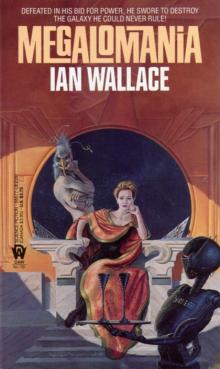 Megalomania
Megalomania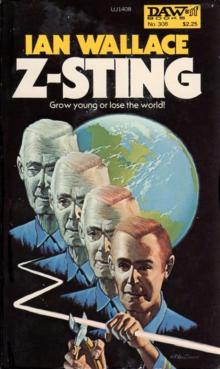 Z-Sting (2475 CE)
Z-Sting (2475 CE)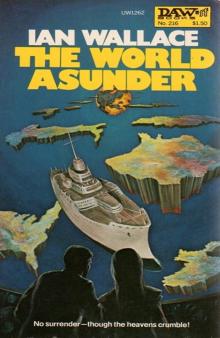 The World Asunder
The World Asunder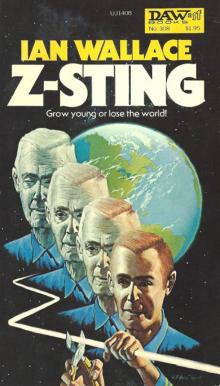 Z-Sting
Z-Sting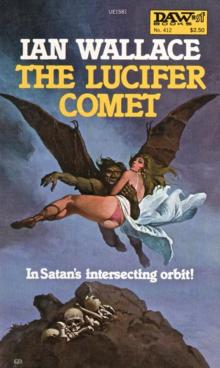 Lucifer Comet (2464 CE)
Lucifer Comet (2464 CE)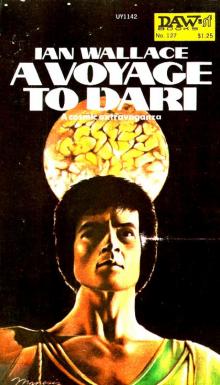 A Voyage To Dari
A Voyage To Dari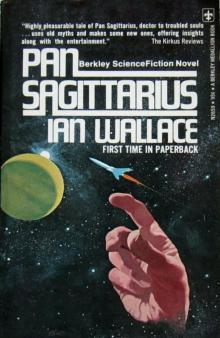 Pan Sagittarius (2509 CE)
Pan Sagittarius (2509 CE)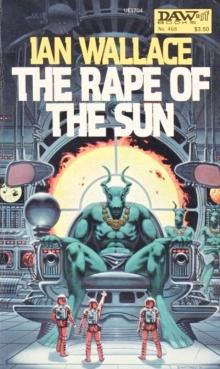 The Rape of The Sun
The Rape of The Sun